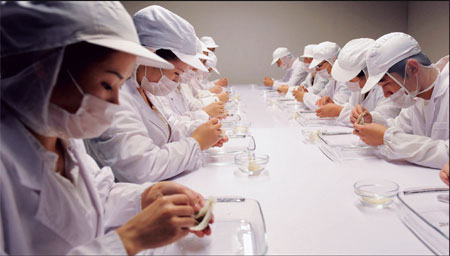More tangled than a bird's nest
Updated: 2013-08-23 08:10
(HK Edition)
|
|||||||
|
Spot checks on rare 'blood-red' bird's nests from 491 dealers in Zhejiang found an average 4,400 mg of sodium nitrate per kg, far above the legal cap of 70 mg. |
Home of Swallows Ltd is a Hong Kong retailer selling edible bird's nests. It wants to expand onto the mainland, but has met with major difficulties.
Edible bird's nests are comprised largely of secretions from the salivary glands of birds. They are an expensive delicacy that has been part of the Chinese culinary art for hundreds of years.
Frank Pak, founder and managing director of Home of Swallows tells China Daily the company was established in 2000, opening its first store in Ma On Shan, the New Territories.
Although Hong Kong's economy was affected by the dotcom bubble burst in 2000, Home of Swallows enjoyed low rent and labor costs during a time of soft real-estate and equity markets, says Pak.
Home of Swallows imports bird's nests from Indonesia and Malaysia. Pak says he still does most of the purchasing personally, to ensure the quality of the products.
The firm also developed various kinds of products at lower prices: beverages and chocolates that contain little bird's nests, for the mass market.
"The firm once had over 20 stores in Hong Kong at 2006 and 2007, but the business model of retailing in the city changed and we had to change our strategy too," says Pak.
He explains that in 2006 more than 70 percent of the company's customers were local, and maybe 20 percent travelers from the mainland. After introduction of the Individual Visit Scheme in 2003, customers from the mainland increased rapidly and soon the majority of the company's revenue came from mainland customers.
"Meanwhile, the rent started to rise sharply, so we closed several stores located in remote areas where mainland visitors rarely go," says Pak, adding that Home of Swallows currently owns 13 stores in Hong Kong.
Pak says around 70 percent of its customers are from the mainland and at its Causeway Bay and Tsim Sha Tsui stores, mainland visitors account for up to 90 percent of its total customers.
Home of Swallows opened its first self-operated store on the mainland in Shenzhen in 2006 and others followed. By 2011, aside from its own stores, it also had 10 franchise stores in major cities on the Chinese mainland.
But in 2011, the industry and commerce administration of Zhejiang province found excessive amounts of sodium nitrate in edible bird's nests imported from Malaysia.
Sodium nitrate is a chemical used to produce food preservatives and fertilizers. Nitrate poses health risks, including cancer, if ingested in large amounts.
Spot checks on rare "blood-red" bird's nests from 491 dealers in Zhejiang found an average 4,400 mg of sodium nitrate per kg, far above the allowed cap of 70 mg per kg, according to Xinhua news agency.
Soon, pharmacies on the mainland took edible bird's nests off their shelves and the central government stopped importing them from Malaysia. Dried bird's nests were then banned from being carried across the border from Hong Kong.
The entire industry in China was affected and Home of Swallows was not spared, as people were panicked and many of them just stopped purchasing bird's nests at all, says Pak. Since then, the company's sales have fallen 50 percent from their peak. Some mainland branches had to be closed.
"I believe the worst time is behind us. I learned that the central government recently gave permission to 11 bird's nests wholesale companies in Malaysia to sell products into China," he says.
Pak says he believes that people's confidence in bird's nests will slowly return, and Home of Swallows is ready to "return" to the mainland market.
He plans to open more self-operating stores as well as franchise stores once that happens.
Pak also says the company will promote online sales and also try to get its products into more supermarkets on the mainland.
"The market on the mainland is too large after all, opening stores would not be fast enough for us," he says.
(HK Edition 08/23/2013 page4)
